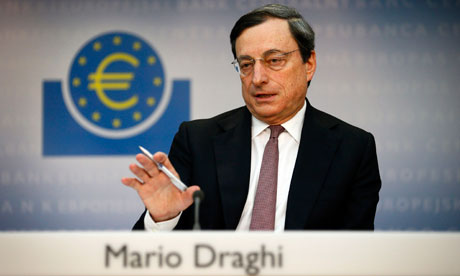Will the European Central Bank (ECB) be lowering rates below 1%? If they do will it make any difference to the Irish market? Today we look at some of the key considerations and how it will affect you if rates are lowered.
In simple terms, interest rates affect different people in different ways, people with certain types of debt become better off, some with debt see no difference, and the same goes for savers, some benefit while others lose out – we'll look at these scenarios along with some background.
Firstly, consider where this rate cut may come from. The current ECB President Mario Draghi is a fairly plain speaking guy for an economist, and only last night he warned that the euro currency union is "unsustainable" without stronger political and financial ties, and called for a new course to save it from a crippling debt crisis. Certainly cause for concern given the normally guarded language the central bankers speak in – and at times of financial crisis a common central bank reaction is to drop rates.
Currently the ECB interest rate is at an historic low, Draghi surprised everybody when he took office by promptly lowering rates (people figured he wouldn't as former president Jean Claude Trichet didn't allude to any forthcoming rate cuts as he left last October). Draghi is not an inflation hawk to the same degree as Trichet was, and even Jean Claude would countenance a rate cut now given that inflation has dropped below 2% in Germany.
The ECB mandate (outside of money supply) is to keep inflation 'close to, but below 2%', in April the Euro area inflation rate fell from 2.6% to 2.4% - the trajectory is clear, as is the exchange rate with the Euro almost matching a two year low against the Dollar (which is still the worlds safe haven currency).
That a rate reduction is likely is a commonly held belief, the question is perhaps about 'when'. Some economists think that it will be delayed until after Greek elections, and others are saying that some ongoing drops in inflation will be needed to justifty a rate cut. Personally I wouldn't be phased if Draghi once again took the markets by surprise with a pre-emptive rate cut.
This doesn't spell disaster (lower rates are designed to aid recovery, they are not a portent of guaranteed glum future), many of the largest economies in the world are already ahead of us – The US Federal Reserve rate is 0.25%, in the UK it is 0.5%, and in Japan it is 0.1% and in Switzerland (also considered a 'safe' nation currency) it is 0.25%.
Even in growing economies like Brazil they are getting rate cuts (expected 0.5% reduction to 8.5% this week), but they have strong inflation and that makes the 'real' interest rate (where inflation is taken into consideration) about 3%.
How will you be affected? It depends, if you already have a mortgage then chances are a rate cut will be to your benefit because 400,000 of the 764,000 mortgages are on tracker rates where rate changes are embedded in the price.
If you have a mortgage then a 0.25% rate cut will generally knock about €13 off your monthly payment for every €100,000 borrowed over 25 years, so if your loan is 200k that'll be €26 a month or just over €300 a year in reduced costs.
That leaves borrowers on fixed rates (who won't see any change) and those on Standard Variables who probably won't get the benefit passed on.
Last November the state bullied AIB into passing on a rate cut – after they didn't pass on rate increases, making AIB standard variable mortgages better than trackers because when rates go up the price doesn't increase but when rates go down they do! This was a political construct and a mistake, meaning AIB are now lending at loss making prices, and we have a crazy situation where a regular person can borrow from a state owned bank for cheaper than the bank or state can borrow from anywhere else, thus giving individuals better credit conditions than the banks or the country.
One of the few ways for a bank to get that margin back (because increasing rates is really unpopular) is to avoid passing on rate cuts. Ptsb probably will pass it on, everybody else won't.
That is borrowers covered, next is how it will affect savers. If you are on the other side of the equation and have savings then you are either on a fixed term account where your price is already guaranteed, or you are on a variable savings rate in which case your savings rate would drop.
The most popular fixed accounts are for 12 months (thus it is a term with high competition) and for them it only becomes an issue at 'rollover', for those on variable savings it could be a good time to switch – fast! - into something fixed. Alternatively, you can do nothing but chances are your interest rate will drop.
Chances are interest rates will drop anyway, there are many indications coming from banks that deposit pricing has gone astray and they all want to drop their rates but are afraid of losing their deposits to other institutions.
The only thing I can be certain of is that this rate cut will be used as an opportunity by the banks to pay their depositors less, and to gain some margin in variable rate holders, so plan accordingly!







